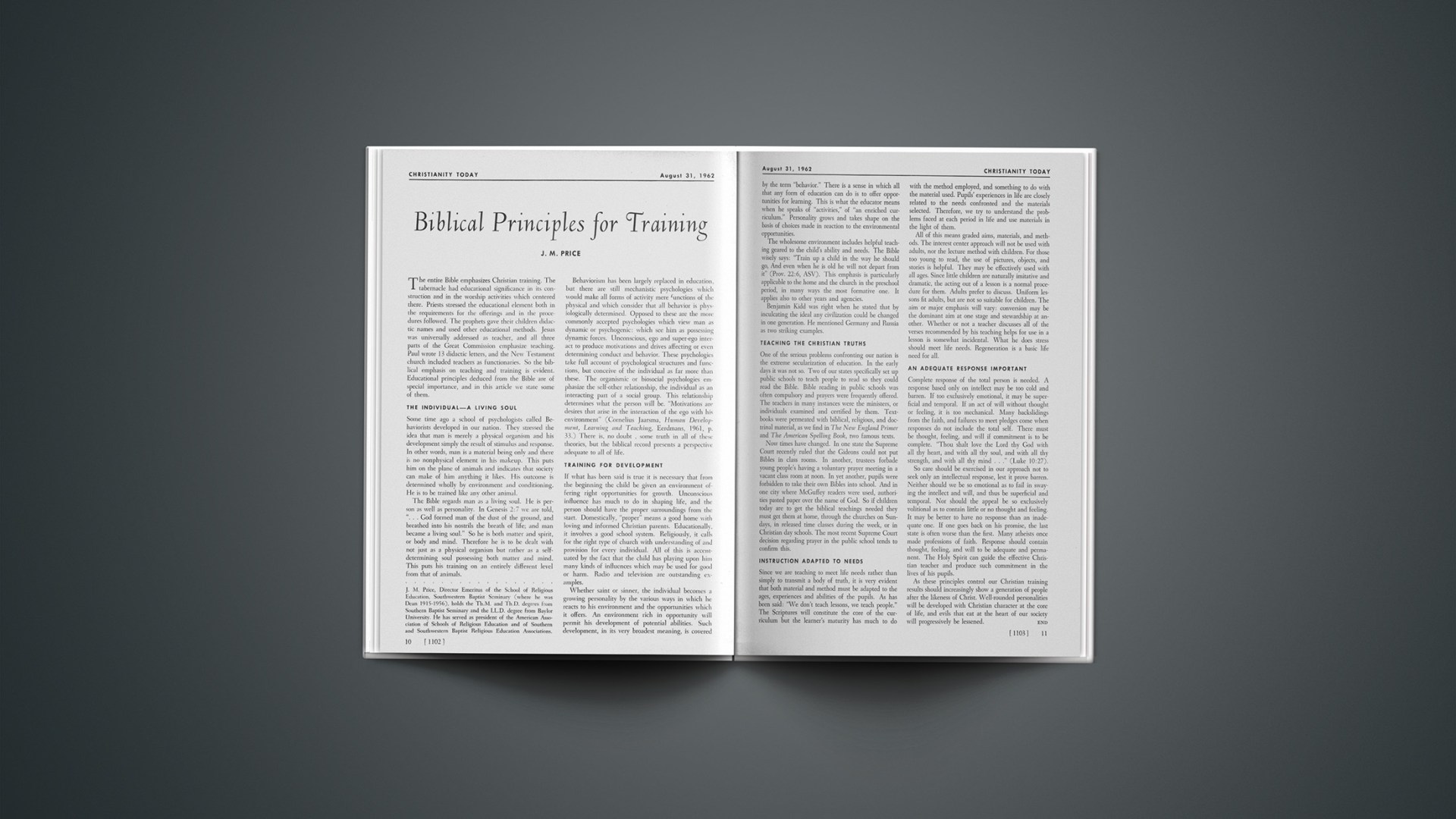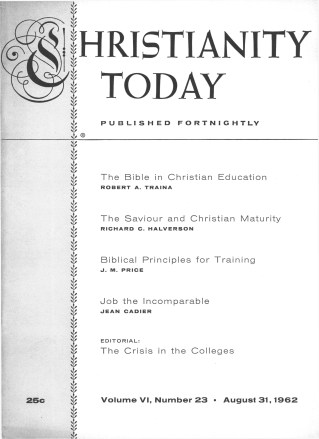The entire Bible emphasizes Christian training. The tabernacle had educational significance in its construction and in the worship activities which centered there. Priests stressed the educational element both in the requirements for the offerings and in the procedures followed. The prophets gave their children didactic names and used other educational methods. Jesus was universally addressed as teacher, and all three parts of the Great Commission emphasize teaching. Paul wrote 13 didactic letters, and the New Testament church included teachers as functionaries. So the biblical emphasis on teaching and training is evident. Educational principles deduced from the Bible are of special importance, and in this article we state some of them.
The Individual—A Living Soul
Some time ago a school of psychologists called Behaviorists developed in our nation. They stressed the idea that man is merely a physical organism and his development simply the result of stimulus and response. In other words, man is a material being only and there is no nonphysical element in his makeup. This puts him on the plane of animals and indicates that society can make of him anything it likes. His outcome is determined wholly by environment and conditioning. He is to be trained like any other animal.
The Bible regards man as a living soul. He is person as well as personality. In Genesis 2:7 we are told, “… God formed man of the dust of the ground, and breathed into his nostrils the breath of life; and man became a living soul.” So he is both matter and spirit, or body and mind. Therefore he is to be dealt with not just as a physical organism but rather as a self-determining soul possessing both matter and mind. This puts his training on an entirely different level from that of animals.
Behaviorism has been largely replaced in education, but there are still mechanistic psychologies which would make all forms of activity mere functions of the physical and which consider that all behavior is physiologically determined. Opposed to these are the more commonly accepted psychologies which view man as dynamic or psychogenic: which see him as possessing dynamic forces. Unconscious, ego and super-ego interact to produce motivations and drives affecting or even determining conduct and behavior. These psychologies take full account of psychological structures and functions, but conceive of the individual as far more than these. The organismic or biosocial psychologies emphasize the self-other relationship, the individual as an interacting part of a social group. This relationship determines what the person will be. “Motivations are desires that arise in the interaction of the ego with his environment” (Cornelius Jaarsma, Human Development, Learning and Teaching, Eerdmans, 1961, p. 33.) There is, no doubt, some truth in all of these theories, but the biblical record presents a perspective adequate to all of life.
Training For Development
If what has been said is true it is necessary that from the beginning the child be given an environment offering right opportunities for growth. Unconscious influence has much to do in shaping life, and the person should have the proper surroundings from the start. Domestically, “proper” means a good home with loving and informed Christian parents. Educationally, it involves a good school system. Religiously, it calls for the right type of church with understanding of and provision for every individual. All of this is accentuated by the fact that the child has playing upon him many kinds of influences which may be used for good or harm. Radio and television are outstanding examples.
Whether saint or sinner, the individual becomes a growing personality by the various ways in which he reacts to his environment and the opportunities which it offers. An environment rich in opportunity will permit his development of potential abilities. Such development, in its very broadest meaning, is covered by the term “behavior.” There is a sense in which all that any form of education can do is to offer opportunities for learning. This is what the educator means when he speaks of “activities,” of “an enriched curriculum.” Personality grows and takes shape on the basis of choices made in reaction to the environmental opportunities.
The wholesome environment includes helpful teaching geared to the child’s ability and needs. The Bible wisely says: “Train up a child in the way he should go, And even when he is old he will not depart from it” (Prov. 22:6, ASV). This emphasis is particularly applicable to the home and the church in the preschool period, in many ways the most formative one. It applies also to other years and agencies.
Benjamin Kidd was right when he stated that by inculcating the ideal any civilization could be changed in one generation. He mentioned Germany and Russia as two striking examples.
Teaching The Christian Truths
One of the serious problems confronting our nation is the extreme secularization of education. In the early days it was not so. Two of our states specifically set up public schools to teach people to read so they could read the Bible. Bible reading in public schools was often compulsory and prayers were frequently offered. The teachers in many instances were the ministers, or individuals examined and certified by them. Textbooks were permeated with biblical, religious, and doctrinal material, as we find in The New England Primer and The American Spelling Book, two famous texts.
Now times have changed. In one state the Supreme Court recently ruled that the Gideons could not put Bibles in class rooms. In another, trustees forbade young people’s having a voluntary prayer meeting in a vacant class room at noon. In yet another, pupils were forbidden to take their own Bibles into school. And in one city where McGuffey readers were used, authorities pasted paper over the name of God. So if children today are to get the biblical teachings needed they must get them at home, through the churches on Sundays, in released time classes during the week, or in Christian day schools. The most recent Supreme Court decision regarding prayer in the public school tends to confirm this.
Instruction Adapted To Needs
Since we are teaching to meet life needs rather than simply to transmit a body of truth, it is very evident that both material and method must be adapted to the ages, experiences and abilities of the pupils. As has been said: “We don’t teach lessons, we teach people.” The Scriptures will constitute the core of the curriculum but the learner’s maturity has much to do with the method employed, and something to do with the material used. Pupils’ experiences in life are closely related to the needs confronted and the materials selected. Therefore, we try to understand the problems faced at each period in life and use materials in the light of them.
All of this means graded aims, materials, and methods. The interest center approach will not be used with adults, nor the lecture method with children. For those too young to read, the use of pictures, objects, and stories is helpful. They may be effectively used with all ages. Since little children are naturally imitative and dramatic, the acting out of a lesson is a normal procedure for them. Adults prefer to discuss. Uniform lessons fit adults, but are not so suitable for children. The aim or major emphasis will vary: conversion may be the dominant aim at one stage and stewardship at another. Whether or not a teacher discusses all of the verses recommended by his teaching helps for use in a lesson is somewhat incidental. What he does stress should meet life needs. Regeneration is a basic life need for all.
An Adequate Response Important
Complete response of the total person is needed. A response based only on intellect may be too cold and barren. If too exclusively emotional, it may be superficial and temporal. If an act of will without thought or feeling, it is too mechanical. Many backslidings from the faith, and failures to meet pledges come when responses do not include the total self. There must be thought, feeling, and will if commitment is to be complete. “Thou shalt love the Lord thy God with all thy heart, and with all thy soul, and with all thy strength, and with all thy mind …” (Luke 10:27).
So care should be exercised in our approach not to seek only an intellectual response, lest it prove barren. Neither should we be so emotional as to fail in swaying the intellect and will, and thus be superficial and temporal. Nor should the appeal be so exclusively volitional as to contain little or no thought and feeling. It may be better to have no response than an inadequate one. If one goes back on his promise, the last state is often worse than the first. Many atheists once made professions of faith. Response should contain thought, feeling, and will to be adequate and permanent. The Holy Spirit can guide the effective Christian teacher and produce such commitment in the lives of his pupils.
As these principles control our Christian training results should increasingly show a generation of people after the likeness of Christ. Well-rounded personalities will be developed with Christian character at the core of life, and evils that eat at the heart of our society will progressively be lessened.










